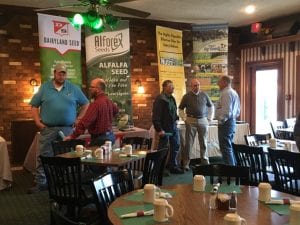The essence of an extension program that addresses field crop production is to help farmers meet their goals of producing sufficient quantities of highly nutritious feed in an environmentally compatible manner. Integrated pest and crop management practices provide the foundation of the program. Practices that contribute to environmental stewardship are a high priority for both building awareness and implementation. Environmental stewardship practices reduce non-point sources losses of soil and nutrients. Safe pesticide handling and application is required by law and licensed pesticide applicators need to earn continuing education credits to maintain their licenses.
This past winter I offered the Annual Winter Crop Meeting (WCM), two plant protection meetings, and a pesticide applicator training with certified crop advisor (CCA) and DEC pesticide re-certification credits available for attendees. I helped plan the topics for the Tompkins County Ag Summit, which focused on farming with changing weather patterns, and co-sponsored the Manure Handling and Trucking Safety Workshop organized by Dairy Support Services, the Potter brothers’ regional custom work business.
An overview of a few of the key topics follows:
- The WCM and plant protection meetings addressed the management options available when challenged with resistant species of insects and weeds, strategies and tools for adaptive management for N in season, and species options that offer improvements in feed quality.
- A talk entitled “What Difference Does 2 degrees make?” provided an overview of global climate systems and the significance of a warming planet.
- For some time, there has been a lot of buzz on the internet around glyphosate and its health risks, much of it sensationalized with many claims not supported by scientific data. Dan Wixted from the Cornell Pesticide Management and Education Program presented a review of data and the relationship of glyphosate to non-Hodgkin’s lymphoma cancer incidence. Dan used the relationship between toxicity and exposure to frame the assessment of risk of harm from glyphosate or any agrichemical.
- Learning from peers’ experience is always of interest to farmers. A farmer panel of no-till practitioners was featured at the Winter Crop Meeting. At the Crop Protection meeting in Horseheads, a dairy nutritionist, grower, and custom operator comprised a panel on growing soybeans and the infrastructure required for home grown grain.
These forums are planned to disseminate information about current issues and research findings to attendees to help them meet their goals of improved crop quality and yield with decreased costs or increased income as a resulting outcome.

